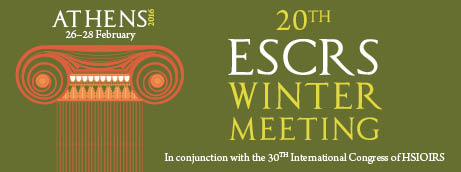Posters
(results will display both Free Papers & Poster)
Revisiting calculation of Toric intraocular lenses: application and adjustment of an original nomogram in our clinical practice
Poster Details
First Author: E.Patsoura GREECE
Co Author(s): N. Tanaskovic S. Georgaras
Abstract Details
Purpose:
To assess the potential application of the Baylor nomogram in our clinical practice.
Setting:
Research and Therapeutic Institute Ophthalmos, Ygeia Hospital, Athens, Greece
Methods:
Retrospective study including 81 eyes that underwent cataract surgery with toric intraocular lens (IOL) implantation (Acrysof IQ toric, Alcon) between 2013-2014. Toric IOL power was calculated based on Holladay II formula and the cylindrical power with the web based calculator. Postoperative refractive results and the
potential impact of adjusting the IOL power based on the nomogram was assessed.
Results:
42 eyes had with the rule (WTR) corneal astigmatism, 33 against the rule (ATR) and 6 oblique preoperatively. 42,85% of WTR patients ended up with a ATR refractive astigmatism post operatively indicating an overcorrection that was higher in cases with corneal astigmatism less than 1,7D. 23,81% of WTR eyes demonstrated a WTR refractive cylinder postoperatively and 28,57% no cyl. The WTR eyes that remained with WTR refractive astigmatism had a longer axial length .54,54% of ATR preoperatively remained with a ATR astigmatism postoperatively, 30,3% had no refractive cyl and 9% were overcorrected having a WTR cyl post surgery.
Conclusions:
In eyes with WTR astigmatism adjusting the toric power according to Baylor nomogram will most likely result in postoperative WTR refractive astigmatism. Caution should be taken in eyes with long axial length where adjustment may not be necessary. Overcorrection of ATR eyes using the web based calculator is rare so so if conversion of the cylindrical axis is not wanted (e.g. uniocular surgery) then adjustment according to the nomogram should be avoided. FINANCIAL DISCLOUSRE: NONE


